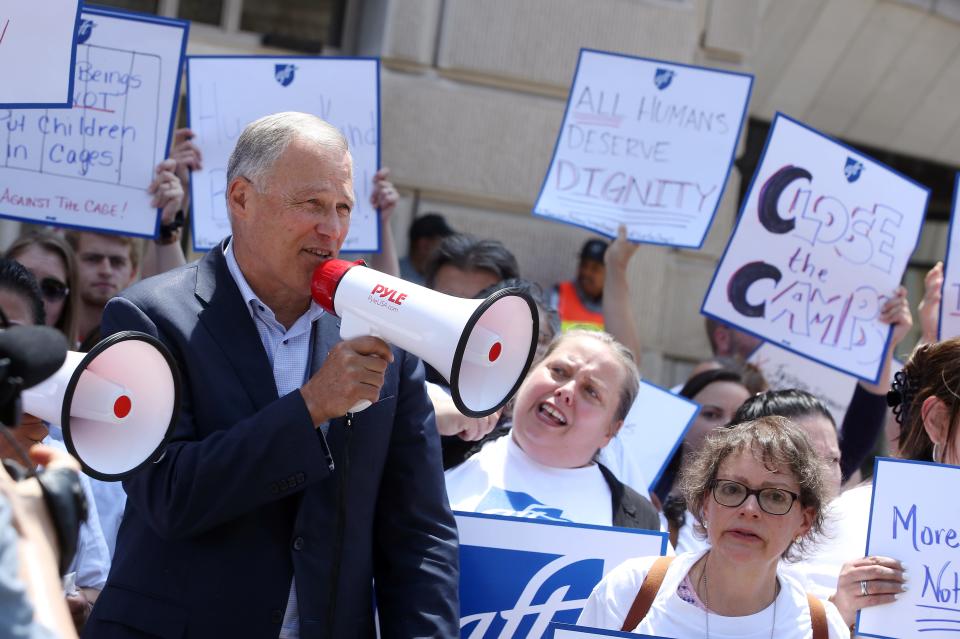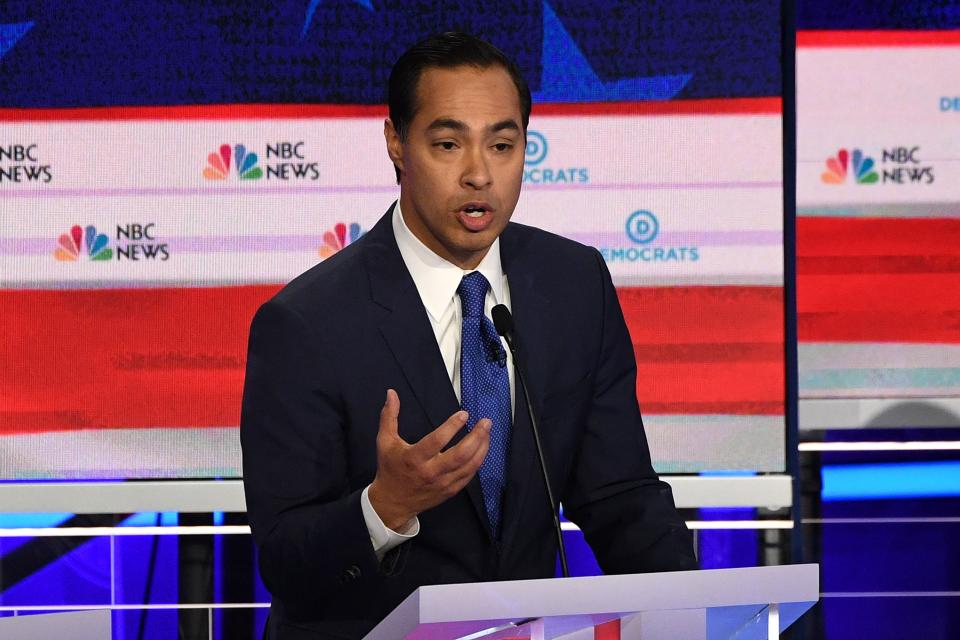Jail parents over skipping school? Some 2020 Democrats threatened it -- and some say no
As California attorney general, Kamala Harris brought down truancy rates and got more kids into the classroom – by threatening jail time for their parents.
Any kind of criminal charges for truancy is controversial, and the records of 2020 Democrats show candidates who have stood on both sides of the issue. An increasing number of top candidates want to ease criminal punishment for truancy as part of their platforms. Others have championed efforts in their states to keep truant kids out of jail.
Then there are the former prosecutors — Harris and Sen. Amy Klobuchar, whose policies put children and parents in court. Harris especially pushed tough-on-truancy, shepherding it into law in California.
The policy has lost favor among experts and candidates, and Harris has said she regrets some of the effects of prosecuting truancy. But it worked, her defenders say.
Still, bringing prosecution into school settings was misguided from the start, education experts claim. The policy fostered the disproportionate criminalization of people of color, experts say. And even without jailing, a day in the courtroom can wreak havoc on the life of a parent who must miss work and arrange for childcare.
Jail time for truancy still happens: Mom sent to jail after her 6-year-old missed 26 days of school
Kamala Harris' regrets on truancy
Harris’ controversial history with truancy dates back to 2006. That's when, as San Francisco's district attorney, she started a program to lower school truancy rates. If the first two stages of the program, education and intervention, failed, parents were subject to prosecution.
In 2010, Harris pushed for a California law that allowed prosecutors to fine or jail a parent “who has failed to reasonably supervise and encourage the pupil’s school attendance.”
In the years since, Harris has walked away from these positions. No one actually was jailed in San Francisco, she emphasizes. She has billed herself as a "progressive prosecutor" whose aim was never to lock up parents of truant children.
She knows how to 'thrown an elbow': How California politics shaped the 2020 hopeful
“My regret is that I have now heard stories where, in some jurisdictions, DAs have criminalized the parents. And I regret that that has happened,” Harris told Pod Save America in April. “And the thought that anything that I did could have led to that, because that certainly was not the intention – never was the intention.”

'Truancy' is outdated
Students of color are affected more than white students when school issues turn into court issues, argues Demetrias Wolverton, a community organizer for YWCA Kalamazoo who is lobbying the Michigan Legislature to change its anti-truancy laws.
"That perpetuates poverty. That perpetuates the disproportionate number of people of color who are in the criminal justice system."
But a hardline approach is falling out of favor.
Former Vice President Joe Biden, another 2020 candidate, has unveiled a plan that would end criminal detention for offenses like truancy. This week, Sen. Elizabeth Warren and Sen. Bernie Sanders both released proposals to decriminalize truancy.
Those plans all include similar language aimed at breaking the "school-to-prison pipeline," with the three proposals citing statistics that show students of color are disproportionately disciplined. Warren's proposal promises to repeal the 1994 Crime Bill, which Biden authored, claiming its tough-on-crime approach was misguided.
It's not that advocates think students should be allowed to skip school. In the 2015-16 school year, nearly 8 million children were chronically absent in the United States, according to data from the Department of Education’s Office of Civil Rights.
“If you’re not in school on a regular basis, good stuff doesn't usually happen,” said Robert Balfanz, a Johns Hopkins professor. Missing school is connected to high drop-out rates and barriers to college success, Balfanz's research has found.
For decades, state education boards collected data and enforced laws on truancy, which usually covers only unexcused absences. Now, advocates are focusing on absences of all kinds. The goal: intervene when students are missing school, period – not just when they don't have an excuse.
Prosecute the students instead?
Some states such as Texas and Washington even used to prosecute students themselves, leaving them with criminal records that prevented them from enlisting in the military and applying to college.
In those two states, some of the leaders who pushed to decriminalize missing school are running for president.
In May, Washington Gov. Jay Inslee signed a law that banned jailing truant children.

Annie Blackledge, executive director of the Mockingbird Society, a Seattle-based organization that strives to end youth homelessness, fought for the bill. She said prosecuting truancy placed an undue burden on families of color who are disproportionately poor. For a parent working multiple jobs, a day in a courtroom can pose a host of challenges – from missing pay to arranging for childcare.
The statewide numbers are stark. While students on free and reduced lunch composed 44.7% of Washington's public school population in 2017, they made up 93% of the petitions filed for truancy.
Prosecuting truancy has no benefit – to society or to families and children, Blackledge said. “Parents would get kids to go to school if they could. There are obviously other issues going on," she said. "It's not just defiance, which is how a lot of people frame the truancy issue.”
Although Blackledge said her staunchest supporters were in the Legislature, she said Inslee was "very open to listening" to the stories of homeless youth, who are particularly susceptible to chronic absenteeism.
'Now we know more'
In Texas, truancy was decriminalized in 2015. As mayor of San Antonio, Julián Castro – another 2020 candidate – supported reform efforts before the bill's passage.

Before 2015, more than 100,000 cases were being filed annually against kids in Texas for truancy, said Deborah Fowler, executive director of advocacy group Texas Appleseed. That left many with criminal records that hampered their career prospects.
“It was a really damaging system," Fowler said. "Research now shows that kind of punitive approach to status offenses really doesn't work, and quite often has the opposite effect.”
Through years of sitting in Texas courtrooms, Fowler said the group noticed children of color and children with disabilities were overrepresented in truancy cases, as well as children who had to care for sick relatives.
Not everyone in the Democratic field is distanced from Harris’ efforts. As attorney general of Minnesota’s largest county from 1999 to 2007, Klobuchar pushed tough-on-truancy policies that could result in students and parents appearing in court.
Klobuchar’s efforts were part of a larger, now outdated, attempt for the legal system to support schools in boosting attendance, said Amber Humm Patnode, a researcher who specialized in chronic absenteeism at the University of Minnesota.
“Now we know more,” she said.
'Kamala Harris is just getting flak'
Despite the criticisms of bringing prosecution into the education system, experts and activists were loath to criticize Harris personally.
“I don't believe she’s interested in locking parents up,” said University of San Francisco education professor Darrick Smith. “I believe that there's a larger lack of sophisticated understanding of the issues within our educational system.”
“I think Kamala Harris is just getting flak,” Wolverton said. “Kamala Harris is not the only prosecutor or elected official that may have over-prosecuted parents for truancy or for any other factor.”
And despite others' criticism of her truancy policies, Harris' push for more data on chronic absenteeism through her In School and On Track reports is often overlooked, said Hedy Chang, executive director of chronic absenteeism advocacy group Attendance Works.
“Harris totally shifted her tone as attorney general from a focus on punitive to a focus on positive,” Chang said. “I don't think there’s as much coverage of the really important role she played later on.”
This article originally appeared on USA TODAY: Bernie Sanders, Kamala Harris, 2020 election candidates on truancy

